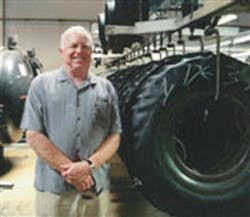'You either grow or go away': Parkhouse does what it takes to survive
Nobody has ever accused Jim Parkhouse of being timid. Goal-oriented? Yes. Aggressive? You bet. "Do I tick people off at times?" he asks. "Sure, I do."
But it's hard to turn a bare-bones, single-location service station into a diversified, $93 million-a-year operation by rolling over in the face of competition and letting opportunities slip by.
Solid foundation
Parkhouse began selling tires at his gas station in 1959 at the age of 22. He incorporated Bell Garden, Calif.-based Parkhouse Tire in 1971. The same year, he started selling commercial truck tires, and added retreading to the dealership's line-up a few years later.
Parkhouse Tire now includes 10 full-service commercial tire centers that sell truck, OTR, forklift and lawn and garden tires. Its largest facility, in Fontana, Calif., spans 10 acres.
The dealership runs four retread plants within those centers that produce 750 truck and 30 light truck units a day overall, according to Modern Tire Dealer statistics. Each retread facility operates as its own profit center.
Parkhouse Tire also reconditions wheels at two locations, maintains a dedicated OTR tire section repair shop and runs 120 service trucks round-the-clock. Three of Parkhouse's sons -- Brent, Bart and Brian -- are intimately involved with the company's day-to-day operations.
Parkhouse has no illusions about what it takes to be successful. "All businesses operate on the same principle -- it's just that we sell different widgets. The basics never change. You either practice good business or you don't."
Eggs in many baskets
"We look at everything as part of our overall package," Parkhouse explains. "We're quite diversified in our mix, (but) it all goes to the bottom line."
Unfortunately, the bottom line has fallen, he says. Like other players in the commercial tire business, "our business is flat. We're at a standstill."
Parkhouse blames much of that on deteriorating gross profit margins, which, in turn, have required him to sell more volume in order to make up the difference. Meanwhile, he's trying to keep costs down by "watching everything we do."
The veteran dealer turns his inventory eight times a year. "That's on your fast-moving products, not every tire." Specialized items, like industrial tires, tend to sit longer than others. But 22- and 24-inch truck tires remain in great demand.
OTR tires, which Parkhouse "got into in a big way during the 1990s," have been profitable. The high-ticket items, sold mainly to construction companies, make up 30% of his total business. Several of Parkhouse Tire's 46 commercial salesmen concentrate exclusively on OTR tires. "An OTR salesman is more of a specialist."
Parkhouse also constantly reinvests in facilities and equipment, even when times are tough. "We just did a big upgrade in San Diego" and put up new buildings a couple of years ago in Fontana and Escondido, Calif., he says. "We monitor our equipment, too." Parkhouse updates his service trucks every six years. "We don't run old stuff. We try to have the best-looking equipment on the street."
Never look back
Selling tires is a dramatically different game than when he started, Parkhouse admits. "When I went into business, $1 million a year was a lot of money." But wallowing in nostalgia isn't his style. "The day of the mom-and-pop is over. You either grow or go away."
Parkhouse has acquired 10 dealerships over the past several years, four in 1998 alone. He has no plans to add facilities at the moment, but is always looking at possibilities. The same goes for his brand mix. Parkhouse sells Bridgestone, Firestone, Michelin, BFGoodrich, Yokohama, Continental and General brand products. "To exist in the commercial business, you need to have two of the three (major tiremakers)."
Parkhouse's biggest concern is "manufacturers looking for controlled distribution -- the TCIs, the TDSs, the Wingfoots and the GCRs," all of which, he says, low-ball prices.
"Anytime you sell by lowering the price, you weaken gross profits for everybody. You ruin the (market's) integrity."
Parkhouse does his best to match prices but realizes he can't afford to drop them too far. He also won't sell to just anyone for its own sake. "I prefer to make sales to people with good credit and who require my services."
Though Parkhouse operates in Southern California, a lucrative commercial tire market, he's enough of a realist to admit that opportunities are finite. "To grow you have to take business from someone else. You do that by offering better service than your competitors." He also realizes that today's customer may not be there tomorrow. "With consolidation, there's nothing long-term today. So many of our customers over the years have been acquired by larger companies."
Just the thought of complacency makes Parkhouse cringe. "I'm never happy with my profits. The day you're happy is the day you're dead."
